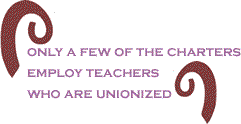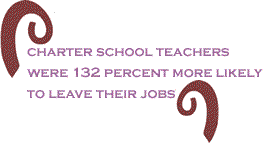| Some
want to weaken support for public education in America,
and an important piece in their struggle is charter schools.
Clearly, though, public schools are such a monumental national
institution, they are not going to go away quietly or easily.
Many
politicians (mostly Republicans and mostly conservative)
over many years have worked to chip away the importance
of public education, even attempting for years to eliminate
the U.S. Department of Education, on the basis that this
governmental function is more properly done by the states.
But, essentially, that argument is more a cover for the
move to privatize as much of education as possible.

Charter
schools, so far, have been a mixed bag, mostly showing that
smaller and more specialized schools can do well right in
the midst of failing public schools, especially in inner
cities - which is where most of them are located.
Mostly,
though, they have not lived up to the hyped praise they
have received from those who somehow benefit from their
existence. In New
York, for instance, some of the high profile proponents
of charter schools are on the political right. Some are
benefiting from the existence of charter schools, serving
on the boards of charter school advocacy groups or having
some connection to the for-profit private companies that
often run charter schools.
Television
programming in New York State this spring has had its full share of advertising in favor of
charter schools. The commercials blast the inaction of the
State Legislature (already roundly criticized for inaction
on many other issues) for failing to lift the cap on the
number of charter schools in the state. At the end of the
commercials, the viewers are asked to contact their representatives
to raise the cap, thus making New York eligible for some $700 million in federal school aid. President
Obama favors charter schools, and so, therefore, does his
education secretary, Arne Duncan.
 Anti-tax
and anti-government groups are in favor of charters and
the result has been that New York�s capital city, Albany, has more than its share. Some school officials and the Albany
Public School Teachers Association (APSTA), an affiliate
of the American Federation of Teachers, are concerned that
more charter schools will threaten Albany�s
traditional schools, with the budget already strained to
accommodate the existing charter schools. This is happening
in other U.S. cities, as well. Anti-tax
and anti-government groups are in favor of charters and
the result has been that New York�s capital city, Albany, has more than its share. Some school officials and the Albany
Public School Teachers Association (APSTA), an affiliate
of the American Federation of Teachers, are concerned that
more charter schools will threaten Albany�s
traditional schools, with the budget already strained to
accommodate the existing charter schools. This is happening
in other U.S. cities, as well.
Charter
schools are public schools - elementary and secondary -
so they receive a per capita payment for each student, paid
for by district taxpayers, yet they are not subject to the
same rules that traditional public schools must follow:
For example, only a few of the charters employ teachers
who are unionized, so there are no such pesky things as
collective bargaining or grievance procedures.
About
1.2 million students attend some 4,100 charter schools across
the U.S., according to the Center for Education Reform,
about 2.4 percent of American students.
It�s
for sure that such a small percentage of students in private
schools paid for by public money will never satisfy opponents
of public education, such as George Will, who recently described
Democrats as �comfortable in a relationship of co-dependency
with teachers unions.� He writes as if Democrats are the
only ones interested in the education of America�s
children.
He
decries the $23 billion (now under consideration) �bailout�
of public education by Secretary Duncan, ignoring that the
two are on the same side of the charter school issue. Obviously,
the growth of charters is not fast enough for Will.
 Perhaps,
though, it�s not so much public education that is the issue
for people like Will, but it�s their animus against unions,
the perennial hobgoblin of the right wing. If the teachers
were not unionized in public schools, Will and his friends
would have to find another scapegoat, although about a year
ago in a speech in Colorado, he indicated that home life and other
factors might have something to do with school performance. Perhaps,
though, it�s not so much public education that is the issue
for people like Will, but it�s their animus against unions,
the perennial hobgoblin of the right wing. If the teachers
were not unionized in public schools, Will and his friends
would have to find another scapegoat, although about a year
ago in a speech in Colorado, he indicated that home life and other
factors might have something to do with school performance.
He
and other critics of public education have few answers and
it is unlikely that many of them have ever spent a year
trying to teach children who are hungry or disturbed in
some way, or both. And, they don�t want to get into the
touchy issue of poverty and how it affects children�s learning,
or why their families are poor.
Secretary
Duncan told an interviewer on ABC last January, �The best
thing that happened to the education system in New
Orleans was Hurricane Katrina.� In retracting his statement
a short time later, he explained that he meant the city�s
schools already were in such disarray before Katrina that
they had to be built up from scratch. Charter schools just
happened to be the main part of rebuilding. New Orleans now educates 57 percent of its students in charter schools.
A
particular favorite charter of Will�s is the American Indian
Public Charter School (AIPCS) in Oakland, Cal., founded by Dr.
Ben Chavis, who started his school for about 200 students
in 2000. Chavis ran the school - he�s now emeritus - with
boot-camp-like discipline, strictly regulating the behavior
and dress of students on school grounds and requiring a
regimen of long hours of study. It worked. AIPCS moved steadily
upward and was listed the fourth-highest middle school in
Oakland in the
2008-9 school year.
Like
other charter schools, AIPCS was able to easily get rid
of teachers thought not to be performing well and Chavis
had pretty much a free hand in setting the rules for everyone
involved in the school, including parents. But then, he
had just 200 students.

The
toll on teachers in charter schools by long hours and lack
of job security has not been much discussed or analyzed,
but a clue might be found in a study by a pair of Vanderbilt University researchers, showed that charter school teachers were 132
percent more likely to leave their jobs, than teachers in
traditional schools. Obviously, there are many possible
reasons for this, including their age, certification or
lack thereof, pay, extended work schedules, and job security.
Sean
Gallagher, founder and principal of Akili
Academy in New Orleans, told a Times-Picayune reporter last March that
the teachers in his school, founded in 2008, are paid for
a 50-hour week, but that they often put in 60-70 hours.
He also said that none of his teachers is married - and,
they don�t have children.
At
Akili, like so many charter schools, there is a feeling
of camaraderie and bonding and the adventure of starting
something new in one�s field. And, in a very bad job market,
there is the satisfaction of actually landing a job.
Charter
schools are educating only about 2.4 percent of America�s children, while the other 97.6 percent
are still being schooled in the despised (by George Will
and his compatriots) traditional public school system and
its teachers� unions. In some ways, the charter school movement
has been growing slowly, since the first one in 1992.
Proponents
may have to live with that. However, when you have a president
of the United States on your side,
charters could take a great leap forward and grow exponentially.
 Or,
Americans can make an effort to recognize the reality and
find ways to make the current system work better. Or,
Americans can make an effort to recognize the reality and
find ways to make the current system work better.
But
if they are hoping to make charter schools the new wave
of education, they might want to hear the words of a young
teacher at Akili in New Orleans, working the 60-70-hour weeks, which are indicative of
the general conditions in charter schools. Without realizing
it, he may be speaking for most teachers and staff at such
schools across the country.
The
Times-Picayune reported that 24-year-old teacher
Francis Giesler said, �I�m totally tired, and if I�m still
working this many hours next year, I maybe wouldn�t work
a fourth year.�
That
doesn�t sound like a blueprint for stability in American
education�s new world.
BlackCommentator.com
Columnist, John Funiciello, is a labor organizer and former
union organizer. His union work started when he became a
local president of The Newspaper Guild in the early 1970s.
He was a reporter for 14 years for newspapers in New York State. In
addition to labor work, he is organizing family farmers
as they struggle to stay on the land under enormous pressure
from factory food producers and land developers. Click here
to contact Mr. Funiciello. |

